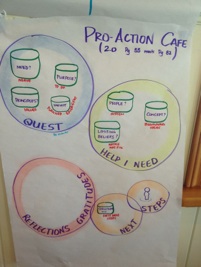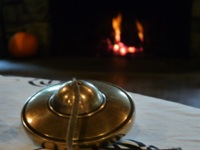Hosting on Bowen Island, at Rivendell Retreat Centre is always a treat. Last week was no exception. The location — there is something about coming to the edge of a continent, boarding a ferry to an island, and then upon reaching that island, traveling to the top of one of its peaks. In this case, Cates Hill, upon with Rivendell sits. The co-hosts — Chris Corrigan, Caitlin Frost, Teresa Posakony. We have much pattern of hosting together that continues to teach me about hosting a field from a field. The participants — old friends and new friends who have come to learn and practice together.
One of the experiments that I most appreciated was a next level of hosting a Proaction Cafe. Myself, Bill Robb, Kathy Olson Adams, Pong Leung, and Leon Janssen scoped out a new version to offer to the group.
The first version of this that I’ve learned and practiced was from several colleagues in Europe. It is a marriage of Open Space Technology and World Cafe. The first part of the process utilizes Open Space. People naming projects on which they will work. What is different from OST is that there is a set number of groups. These people then become table hosts in a cafe format.
What changed in this evolution was the questions we asked during the rounds of cafe. Rather than asking in Round 1, “What is the quest beneath the project?” we dropped in the model of the Chaordic Stepping Stones and a sked people to help fill in the buckets of Need, Purpose, Principles, and a bit on Intended Harvest. We kept the energy of quest, but this model seemed to add some specificity and focus to the table conversations.
sked people to help fill in the buckets of Need, Purpose, Principles, and a bit on Intended Harvest. We kept the energy of quest, but this model seemed to add some specificity and focus to the table conversations.
With a similar spirit of revision for Round 2, rather than asking “What is missing?” we asked, “What is the further help that you need?” and asked people to fill in the buckets of People, Concept, and Limiting Beliefs. We kept the energy of “missing” and “help needed,” but with added specificity.
Our time was short for a third round on next steps, again inspired by “Structure” from the Chaordic Stepping Stones model. Some time for the table hosts to sit in their learning and to sit with a new group of participants. It was even shorter for a group reflection, but mostly to accommodate a closing ritual with the group, wrapping up the entire gathering.
This aspect of timing is important learning for me. Though I can often run a World Cafe in 1.5 – 2 hours, many of these are about exploring purpose and the context of the times we are in. In Proaction Cafe, I really want 2.5 – 3 hours to fully support the movement of projects into energy. And to reflect some of the learning of the group from the project hosts and from participants.
I’m appreciating this experience and others that experiment with method. Proaction Cafe is really quite a brilliant model for welcoming in a relatively short time, 10-12 coaches and co-thinkers to help move ideas into the energy of action.

 ministries in response to the needs and realities of human beings and churches today. Inspiring.
ministries in response to the needs and realities of human beings and churches today. Inspiring.


